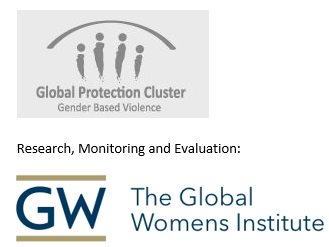Conducting VAWG research in conflict and post-conflict settings can be extremely challenging. Researchers must therefore adhere to strict ethical guidelines to ensure they are upholding a ‘do no harm’ principle. They must only collect data if the benefits outweigh the risks. Data must be collected in a methodologically sound manner, reflecting best practices in the M&E and evaluation fields, with limited risk to the participants. Questionnaires should be pilot tested and implemented by fieldworkers with appropriate training and sensitization on gender and VAWG issues. Security risks are heightened in conflict and post-conflict settings, which means that extra precautions must be in place to protect the safety of all involved in the study. Likewise, confidentiality (e.g. keeping the information given private) and privacy (e.g. ensuring no one overhears the conversation during data collection) must be ensured at all times.
Appropriate referral services for survivors of VAWG who may be re-traumatized and for anyone who may become distressed as a result of participating in the study must be available before any research can begin, regardless of the presence or absence of data on VAWG prevalence or incidence (Murphy et al., 2016). Ideally, researchers should prioritize quality services, but basic care and support must be accessible. Researchers also face particular risks in conflict and post-conflict settings such as political/military interference, security concerns and distress/secondary trauma. Ensure that appropriate measures are also set in place to mitigate risks to researchers (Murphy et al., 2016).
The Global Women’s Institute’s Gender-Based Violence Research, Monitoring, and Evaluation with Refugee and Conflict-Affected Populations: A Manual and Toolkit for Researchers and Practitioner ;
The Better Evaluation website;
Raising Voice’s M&E Guide; UNICEF’s Evaluation Guide for GBV in Emergencies for methodological guidance and sample tools.
